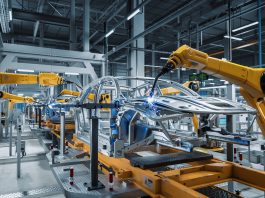Dr Hadi Moztarzadeh, Head of Technology Trends at the Advanced Propulsion Centre, discusses how the APC is positioning the UK automotive industry to compete on the global stage, as the sector transitions to meet the net-zero targets.
Over the past decade, the Advanced Propulsion Centre (APC) has been developing and updating technology and product roadmaps on behalf of the Automotive Council. These include a series of technology-focused reports that provide forecast information and essential insights into future vehicle trends and drivers, ultimately helping to define the next chapter for the UK automotive industry and inform of innovation and research and development (R&D) opportunities.
The first Automotive Council UK roadmap was published in 2013, the same year APC was founded, and we are now proud to take the lead in this initiative. We know the Automotive Council roadmaps are used across the world in boardroom meetings and investment discussions. They play a crucial role in the automotive sector and associated academic and R&D communities, both here in the UK and globally, to support defining R&D agenda, investment plans and scale-up opportunities.
It is time now to update those roadmaps and review our transitional journey to net zero, assessing where we are against where we need to be, and identifying how we can get there as an industry collective.
Time for change
The UK automotive industry is currently on the brink of significant changes, with the 2030 deadline for the ban on the sale of new diesel or petrol vehicles fast approaching. Innovative research and development is happening at pace, as the automotive supply chain focuses on delivering low-carbon and zero-emission technologies. It is time for us to reset the compass on our existing roadmaps, look beyond the tailpipe, and sit down together to support the development of sustainable solutions that will enable us to meet upcoming legislation.
Consultation and consensus are what makes the APC/Automotive Council roadmaps unique. The process provides an important opportunity for original equipment manufacturers (OEMs), the automotive supply chain, academia, and the R&D community, as well as policy and government bodies, to identify, map and discuss specific or common challenges, opening essential dialogue to find shared solutions.
The consultation period for the road mapping project is now underway, with collaborative discussions taking place over the next 12 months. The roadmaps and their narrative reports need to reflect and represent all viewpoints. Inputs from stakeholders across the entire ecosystem is crucial to this. There are several ways that the industry can get involved through expert workshops, surveys, and industry research. Together, we are ensuring that the roadmaps remain fit for purpose to portray the global trends and drivers across the automotive industry as it undergoes its biggest transition in over 100 years.
In addition to the need to ‘take stock,’ our roadmaps have evolved over the past decade to include more holistic views on global trends and drivers for the UK automotive industry. We anticipated the global trends towards electrification and our electrical energy storage (EES) roadmap mapped out some of the major requirements in the battery industry, such as advancement in the battery management system (BMS). This insight enabled UK industry to realise the need for more inclusion of digital solutions, not only for the manufacturing stage of batteries, but also on-vehicle software solutions to make them more efficient and effective.
What’s next for the roadmap process?

© shutterstock/Shark9208888
This next phase of activity will reflect four core Automotive Council priorities:
- Transitioning the OEM manufacturing base to zero-emission platforms;
- Building a resilient supply chain at scale and pace;
- Investing in research and development (R&D); and
- Aiming for end-to-end industry net-zero emissions.
In a recent blog, the APC’s CEO, Ian Constance, reflected on this, saying: “It is that last point which is now becoming more and more important. While achieving zero emissions at the tailpipe is an important step, it represents just the beginning of a much more complex journey. Achieving net-zero emissions throughout the UK automotive industry requires a comprehensive approach, encompassing every stage of the value chain, from material extraction and processing to vehicle disposal. Carbon accounting and elimination are central to this effort, making it an immense challenge and no simple task.”
This latest review will focus on both mobility of people and goods, and the role of the automotive sector in this new transport paradigm. Mobility of people will continue to focus on light duty vehicles (LDVs), buses, and coaches, but will also consider the impact of new mobility trends, such as micromobility. Mobility of goods will include commercial LDVs, heavy goods vehicles (HGVs), agriculture, and off-highway. We will also be reviewing and refreshing our six technology roadmaps:
- Fuel cell systems (which will now evolve into hydrogen storage);
- Lightweight vehicles and powertrains;
- Power electronics;
- Electric machines;
- Electrical energy storage; and
- Thermal propulsion systems.
Across all the above strategic technologies, there will be cross-cutting themes, such as digitalisation; materials and manufacturing supply chain; energy and infrastructure; life cycle assessment; and the circular economy. In the background, we will consider the current economic situation, possible investment opportunities, and the outlook for the workforce and skills development.
Innovating to accelerate the UK automotive industry
In the UK, the automotive industry must continue to innovate in order to reduce costs, and make new-technology vehicles more accessible, thus ensuring it remains competitive on the international stage and robust enough to withstand disruptors to the supply chain. This is only possible through collaboration. Together we can create a stronger, thriving UK automotive industry, offering the entire supply chain the required support at this time of transition. The race to net zero is happening at pace, and these roadmaps will help us with identifying gaps in investment and skills, enabling us to scale up to real-world manufacturing scenarios, and joining the dots between government, manufacturers, R&D, and academia.
It is key to remember that these roadmaps do not belong to the APC or the Automotive Council. We are simply the vehicle to bring the sector together, with the finished product guiding strategy, and helping to focus investment in the right place and at the right time. We would therefore ask our partners and stakeholders to invest the time over the next 18 months to support our efforts and collaborate with us. This will be an outcome-driven process, and we are keen to capture the foresight within industry and academia. Input from varying sources is so important as this will inform much of the thinking about moving to the next level.
The refresh initiative is now live. APC and the Automotive Council are planning the first roadmap dissemination session at the Cenex Low Carbon Vehicle (LCV) event this September. They will continue with a dissemination process via key industry events. Updates will also be available via the APC website. All roadmaps are expected to be finalised and available by September 2024.
Together, we are setting out a strategic vision for the automotive industry, identifying key technology and supply chain priorities, highlighting investment opportunities, and enabling industry and government to work collectively to support the development and commercialisation of innovative technologies.
If you would like to participate in this road mapping campaign, please contact the APC team via
info@apcuk.co.uk
Please note, this article will also appear in the fifteenth edition of our quarterly publication.









